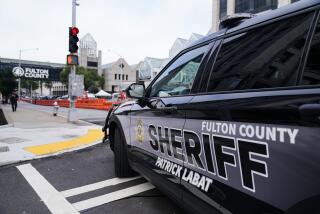Judge in King Case Rejects Request to Dismiss Jury Panel : Trial: The prosecution cites allegations of NAACP attempts to intimidate blacks in the group. But the jurist says no harm was done.
- Share via
SIMI VALLEY — Turning back a request from prosecutors, the judge in the trial of four Los Angeles police officers accused in the Rodney G. King beating refused Friday to dismiss a panel of 114 potential jurors because of allegations that the NAACP attempted to intimidate a small number of blacks on the panel.
Judge Stanley M. Weisberg made his ruling after hearing testimony from four black members of the jury pool, along with James H. Smith, a former member of the National Assn. for the Advancement of Colored People who testified that he introduced himself to several black jurors when they arrived at the courthouse earlier this week.
However, the four jury pool members who testified Friday said Smith did not attempt to persuade them in any way in the highly publicized trial.
“I don’t see any reason for or any legal cause to exclude the entire jury panel,” the judge said. “They are untainted and were not influenced by these events.”
The issue arose in the first week of a lengthy jury selection process and was considered crucial because of the small number of black potential jurors in Ventura County, where only 2% of the population is black. The case has carried racial overtones, including allegations by King that the officers insulted him with racial slurs during the March 3 beating in Lake View Terrace.
Smith, in his testimony, said he lives near the courthouse and simply came to the building on Wednesday--the first day of jury selection--to “observe” the proceedings. He said that he is a former member of the NAACP but was not attending the trial as part of that organization’s ongoing program of monitoring the proceedings.
While admitting that he approached several black jury pool members during a break in the proceedings, Smith added: “I didn’t try to influence anybody.” He said he was simply making “friendly chitchat” and that he did not identify himself as an official with the NAACP.
“My wife is a court reporter,” he said, “so I know better than to try to influence anybody on a jury panel.”
But two of the four jury panel members testified that Smith told them he was indeed a member of the NAACP. Jeff Doolittle of Ventura said he was standing by a window when Smith approached him and identified himself as “somebody from the NAACP.” Doolittle also noted that Smith was talking only to the black members of the jury.
Like the other potential jurors, Doolittle said the contact by Smith would not make it impossible for him to be fair and impartial if he is ultimately seated in the jury box to hear the case. But Doolittle added that he now has the impression the NAACP has its own belief on what kind of verdict should be rendered in the case.
“I kind of get the feeling they want you to vote a certain way for them,” Doolittle said.
He was not, however, asked to elaborate, and local NAACP leaders denied this week that they have any intention of improperly influencing the outcome of the trial.
Terry White, a deputy Los Angeles County district attorney, asked the judge to disqualify all 114 prospective jurors from the Wednesday panel because of Smith’s conduct. But Weisberg declined, noting that none of the panelists have expressed any concern about being intimidated.
The judge did, however, order that no armbands, pins or buttons be worn by spectators during the trial after defense attorney Michael Stone complained that some NAACP court monitors had come to the courthouse wearing black armbands.
More to Read
Sign up for Essential California
The most important California stories and recommendations in your inbox every morning.
You may occasionally receive promotional content from the Los Angeles Times.











